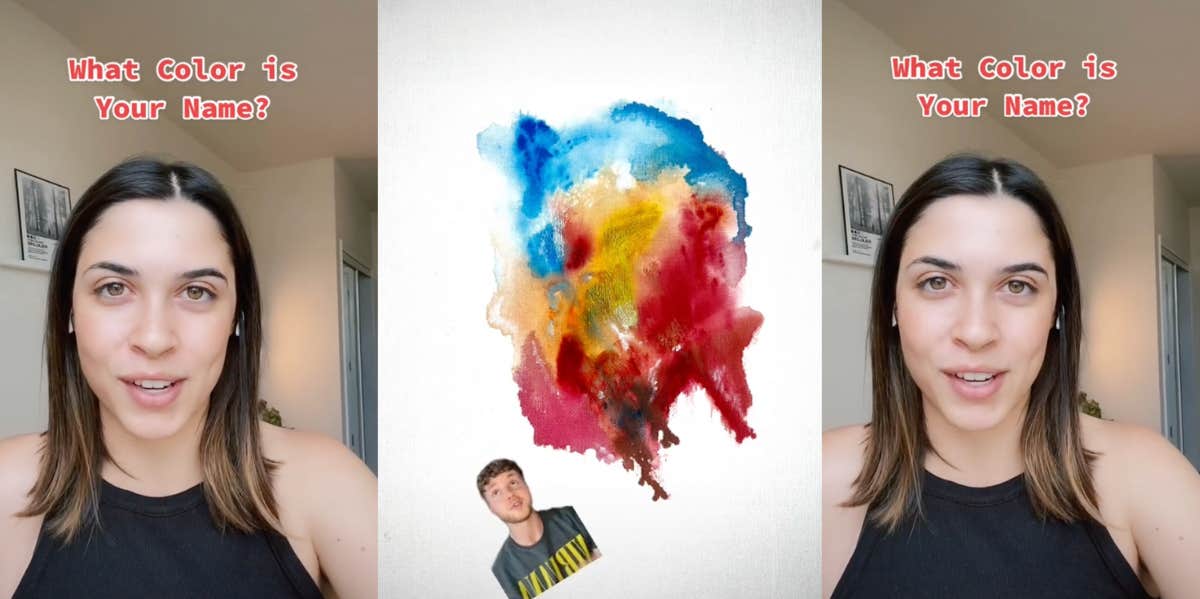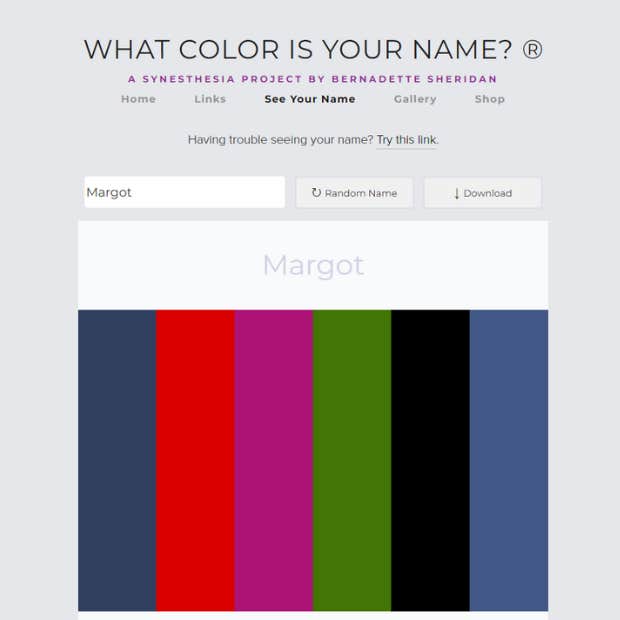How To Take The 'What Color Is Your Name?' Synesthesia Quiz
If you don't have synesthesia, this fascinating test will give you a glimpse into what it's like.
 Connor Rice and Lisa Mckinley via TikTok
Connor Rice and Lisa Mckinley via TikTok TikTokers with synesthesia have stirred up a trend linking colors to names. And now, even people who don't have the condition can get in on the action.
According to Psychology Today, synesthesia is a neurological condition that causes senses to overlap. The most common form of synesthesia is grapheme-color synesthesia which causes individuals to associate letters and numbers with colors.
“Simply put, when one sense is activated, another unrelated sense is activated at the same time,” Psychology Today explains. “This may, for instance, take the form of hearing music and simultaneously sensing the sound as swirls or patterns of color.”
What is synesthesia?
As relayed above, synesthesia is a neurological condition in which stimulation of one sensory or cognitive pathway leads to automatic and involuntary experiences in a second sensory or cognitive pathway.
In simpler terms, it's a blending or crossing of the senses, where individuals might experience the perception of one sense while actually engaging another sense.
For example, a person with synesthesia may see colors when they hear music, taste specific flavors when they read certain words, or associate particular shapes with different numbers or letters.
Synesthesia can manifest in various forms, and not all "synesthetes" experience the same types of associations. Some common types of synesthesia include:
- Grapheme-color synesthesia: Seeing colors associated with letters or numbers
- Chromesthesia: Experiencing colors in response to sounds or music
- Lexical-gustatory synesthesia: Tasting specific flavors when hearing or reading certain words
- Spatial-sequence synesthesia: Associating sequences, such as numbers or months, with specific spatial locations
The exact cause of synesthesia is still not fully understood, but researchers believe it is likely due to differences in the way the brain's neural pathways are connected and process information.
TikTok users with synesthesia have been sharing what colors they see in certain names.
One TikToker with synesthesia, Lisa McKinley, has amassed over 111,000 followers thanks, in part, to her videos in which she shows followers colorful paintings that she associates with certain names.
But plenty of other people on the video-sharing app have shared similar videos.
Another user, Connor Rice, even sells paintings he makes inspired by the colors he associates with certain names and sells them to his followers. He can even tell you what your name "feels" like to him.
One woman with synesthesia has even taken things one step further than the TikTok trend, designing a website that allows those of us without the condition to learn what colors connect to our names.
How to Take the ‘What Color is Your Name’ Quiz
On the website, visitors can plug their names into a program that translates each letter into a color, like someone with the condition would see.
That's it — the site shows what color each letter of your name represents. It generates a color palette that represents your name.
 Photo: synesthesia.me
Photo: synesthesia.me
The website is a project by Bernadette Sheridan who created the platform to explain what she sees in certain letters.
“When I meet new people, I forget their name immediately,” Sheridan explains on the site. “Don’t get me wrong, I hear the name, but my mind is distracted. In my head, I am counting the number of letters in the name, and visualizing the colors of each letter."
“Your name may be Emily, but to me, you’re a bright, sunny swath of five letters with an ‘E’ and an I.’ When I meet you again later, I may think your name is Emily or Jille or Ellie. Those three names ‘look’ remarkably similar to someone who operates as I do — they all have five letters, they all include the letters ‘i,’ ‘l,’ and ‘e.’”
The website is specifically based on how Sheridan experiences synesthesia.
While some symbols have universal translations, such as “a” matching up with red, every person with synesthesia experiences their own “color alphabet.”
This explains why different TikTokers covering the trend may come up with different results for each name.
Some creators have even gotten super specific with the images they see in names thanks to their synesthesia which only makes the trend even more fun!
Jonathan Alfano is a writer and former contributor to YourTango. His work has been featured on MSN, Sports Illustrated, Miami Herald, South Florida Sun Sentinel, Orlando Sentinel, The Charlotte Observer, Kansas City Star, Lexington Herald-Leader, The Sacramento Bee, and more.

